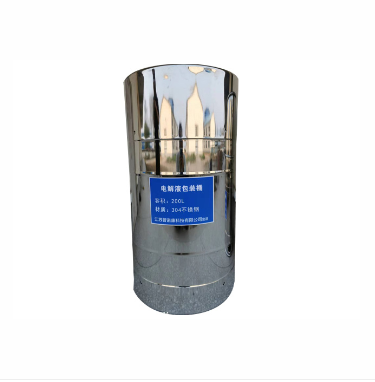Are you tired of dealing with corroded tanks that are costly to replace and maintain? Look no further than the anticorrosion electrolyte tank. This innovative solution utilizes cutting-edge technology to protect your tank from harmful corrosion, ensuring it lasts for years to come. But how does it work, and what are the benefits? Read on as we dive into everything you need to know about this game-changing technology.
What is an anticorrosion electrolyte tank?
An anticorrosion electrolyte tank is a type of tank that utilizes an electrolyte solution to prevent corrosion. The solution, which is typically made up of various chemicals and ions, creates a protective layer on the surface of the tank. This layer effectively blocks oxygen and moisture from coming into contact with the metal, preventing rust and other forms of corrosion.
Anticorrosion electrolyte tanks are commonly used in a variety of industrial settings where chemical storage or processing takes place. They are also used in the transportation industry for storing fuel and other types of liquids.
The technology behind these tanks is constantly evolving, with new materials being developed to improve their durability and effectiveness. Some modern tanks even feature advanced monitoring systems that allow operators to keep track of factors like temperature and pressure in real-time.
Anticorrosion electrolyte tanks provide a cost-effective solution for protecting valuable assets from corrosive damage. By investing in one of these innovative tanks, businesses can save money over time by avoiding costly repairs or replacements due to corrosion-related issues.
How does an anticorrosion electrolyte tank work?
An anticorrosion electrolyte tank is designed to prevent corrosion and damage caused by chemicals and other substances that can be harmful to the metal surface of tanks. It works by creating a protective layer on the metal surface, which prevents contact with harmful substances.
The electrolyte solution used in these tanks contains specific chemicals that aid in forming a protective coating over the exposed metal surface. This coating helps to minimize contact between metals and external agents like water or air.
The process involved in an anticorrosion electrolyte tank is called cathodic protection. In this process, a direct current (DC) voltage is applied across two electrodes placed inside the tank: one acting as an anode and another as a cathode.
When DC voltage passes through them, electrons flow from the anode towards the cathode which creates an electrochemical reaction causing ions from metallic surfaces to migrate toward it. The resulting current reacts with oxygen present on top of metals causing rust formation but also preserves it by creating oxide layers that shield against further degradation.
Using anticorrosion electrolyte tanks provides long-lasting protection for your storage equipment while ensuring efficient performance even under harsh conditions.
Advantages of an anticorrosion electrolyte tank
An anticorrosion electrolyte tank is a storage container designed to resist corrosion caused by the chemical reactions of its contents. These tanks are highly beneficial for industries that deal with harsh chemicals, acids, and alkalis because they protect the stored materials from deterioration and reduce maintenance costs.
One advantage of an anticorrosion electrolyte tank is its durability. The tanks are made from high-quality materials such as fiberglass reinforced plastic (FRP) or stainless steel. This ensures that they can withstand harsh conditions without showing signs of wear and tear.
Another advantage is their low maintenance requirements. Since these tanks are resistant to corrosion, there’s no need for regular cleaning or painting to prevent rusting. This translates into significant cost savings in terms of labor and material expenses.
Anticorrosion electrolyte tanks also offer increased safety benefits since they prevent hazardous leaks or spills resulting from corroded containers. Additionally, these tanks help businesses comply with environmental regulations since they minimize potential chemical spills, which could cause harm to people or wildlife.
Some models feature insulation systems that allow them to maintain stable temperatures inside the tank regardless of external weather conditions. This makes them ideal for storing temperature-sensitive materials such as pharmaceuticals, food products, or electronics.
Using an anticorrosion electrolyte tank has numerous advantages ranging from durability and low maintenance costs to safety compliance and insulation systems capabilities.
How to choose the right anticorrosion electrolyte tank for your needs
When it comes to choosing the right anticorrosion electrolyte tank for your needs, there are a few key factors to consider. First and foremost, you need to determine what type of corrosive materials you will be storing in the tank. This will help you select the appropriate material for the tank's construction.
Next, think about how much space you have available for the tank. Consider both horizontal and vertical dimensions as well as any weight restrictions that may apply.
It is also important to take into account any specific features or accessories that may be required such as heating or cooling systems, level indicators or agitators.
Another crucial factor to consider is whether a standard size tank will meet your requirements or if custom fabrication is necessary. A customized solution can often provide greater flexibility and functionality but typically comes with a higher price tag.
Don't forget about regulations related to storage of hazardous materials which must be strictly adhered to. By taking all these factors into account when selecting an anticorrosion electrolyte tank, you'll ensure that it meets all your operational needs while providing long-lasting protection against corrosion.
Conclusion
To sum it up, an anticorrosion electrolyte tank is a valuable addition to any industrial facility that needs to store and transport corrosive substances. It effectively protects the tank from corrosion while ensuring the quality and safety of the stored materials.
When choosing an anticorrosion electrolyte tank, consider factors such as material compatibility, capacity requirements, and budget constraints. Consulting with a reputable supplier can help you make an informed decision.
By investing in high-quality anticorrosion electrolyte tanks for your business, you can ensure long-lasting storage solutions that will protect your investment and provide peace of mind.


